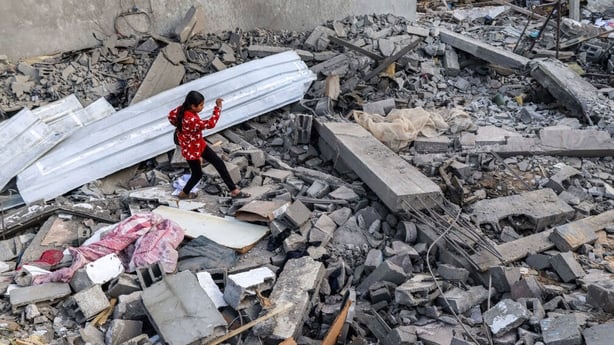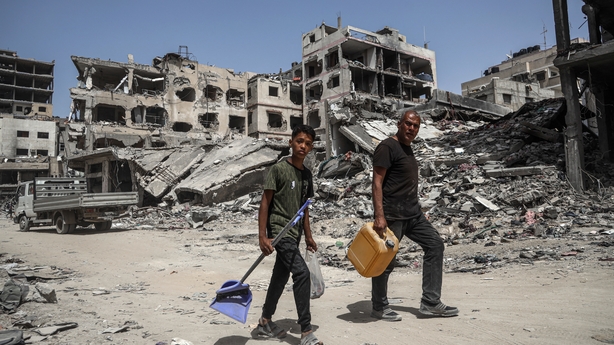US President Joe Biden has demanded that new humanitarian aid be allowed to immediately reach Palestinians in Gaza as key US ally Israel fights Hamas there.
"We're going to immediately secure that aid and surge it... including food, medical supplies, clean water," Mr Biden said after signing a massive military aid bill for Israel and Ukraine, which also included $1 billion in humanitarian aid for Gaza.
"Israel must make sure all this aid reaches the Palestinians in Gaza without delay," he said.
US-Israel relations have been strained by Israel's conduct of the war in Gaza and Israeli Prime Minister Benjamin Netanyahu's plan to send troops into the southern Gazan city of Rafah, where 1.5 million people are sheltering, many in makeshift encampments.
"This bill significantly - significantly - increases humanitarian assistance we're sending to the innocent people of Gaza who are suffering badly," Mr Biden said.
"They're suffering the consequences of this war that Hamas started, and we've been working intently for months to get as much aid to Gaza as possible."

The comments come after the World Food Programme earlier warned that Gaza could surpass famine thresholds of food insecurity, malnutrition and mortality in six weeks.
"We are getting closer by the day to a famine situation," said Gian Caro Cirri, Geneva director of the WFP.
"There is reasonable evidence that all three famine thresholds - food insecurity, malnutrition and mortality -- will be passed in the next six weeks."
A UN-backed report, published in March, said that famine was imminent and likely to occur by May in northern Gaza and could spread across the enclave by July.
Yesterday, a US official said the risk of famine in Gaza, especially in the north, was very high.
Mr Cirri was speaking at the launch of a report by the Global Network Against Food Crises, an alliance of humanitarian and development actors including United Nations agencies, the World Bank, the European Union and the United States.
In its report, the network described the 2024 outlook for the Middle East and Africa as extremely concerning due to the Gaza war and restricted humanitarian access, as well as the risk of the conflict spreading elsewhere in the region.
We need your consent to load this rte-player contentWe use rte-player to manage extra content that can set cookies on your device and collect data about your activity. Please review their details and accept them to load the content.Manage Preferences
"As for Gaza, the conflict makes it difficult and sometimes impossible to reach affected people," Mr Cirri said.
"We need to scale up massively our assistance... But under the current conditions, I'm afraid the situation will further deteriorate."
The UN has long complained of obstacles to getting aid in and distributing it throughout Gaza in the six months since Israel began an aerial and ground offensive against the territory's ruling Islamist militant group Hamas.
Israel has denied hindering supplies of humanitarian aid and blames aid agencies for inefficiencies in distribution.
Israel's military campaign has reduced much of Gaza to a wasteland with a humanitarian disaster unfolding since 7 October when Hamas ignited war by storming into southern Israel.
Mr Cirri said that the only way to steer clear of famine in Gaza was to ensure immediate and daily deliveries of food supplies.
"They've been selling off their belongings to buy food. They are most of the time destitute. Clearly some of them are dying of hunger," he said.

Israeli has intensified its strikes across Gaza, according to residents, in some of the heaviest shelling in weeks.
The army ordered fresh evacuations in the north of the enclave, warning civilians they were in a "dangerous combat zone".
Strikes by air and shelling from tanks on the ground were also reported in central and southern areas of Gaza, in what residents said were almost 24 hours of non-stop bombardments.
In a social media post, Israeli army spokesperson Avichay Adraee urged residents of four zones in Beit Lahiya on Gaza's northern edge to move to two designated areas.
He said the military "will work with extreme force against terrorist infrastructure and subversive elements" in the region.
In a statement the military said it "follows international law and takes feasible precautions to mitigate civilian harm".
The renewed shelling and bombing of northern Gaza comes almost four months after the Israeli army announced it was drawing down troops there, saying Hamas no longer controlled those areas.
This month, Israel also drew down most of its forces in southern Gaza.
However, efforts to reach a ceasefire have failed and Israeli bombardment and raids on territory where its troops have withdrawn are making it difficult for displaced Gazans to return to abandoned homes.
Read more: Latest Middle East stories
This bombardment came after incoming rocket alerts sounded in two southern Israeli border towns, although no casualties were reported.
The armed wing of Islamic Jihad, a group allied to Hamas, claimed responsibility for the attacks on Sderot and Nir Am, indicating fighters were still able to launch rockets almost 200 days into the war, which has flattened large swathes of the enclave and displaced almost all of its 2.3 million people.
Hamas said Israel had achieved only "humiliation and defeat" with its offensive.
Speaking in a video aired by Al Jazeera television, spokesperson for Hamas' armed wing Abu Ubaida called for an escalation in conflict across all fronts and praised Iran for its first direct attack against Israel earlier this month.
He also said Hamas was sticking to its demands in ceasefire talks for Israel to permanently end its war, pull all its troops from Gaza and allow the displaced to return to the north.
Israel has resisted a permanent ceasefire, saying that would only allow Hamas to regroup.
At least 34,262 Palestinians have been killed and 77,229 injured in Gaza since 7 October, according to the health ministry.
